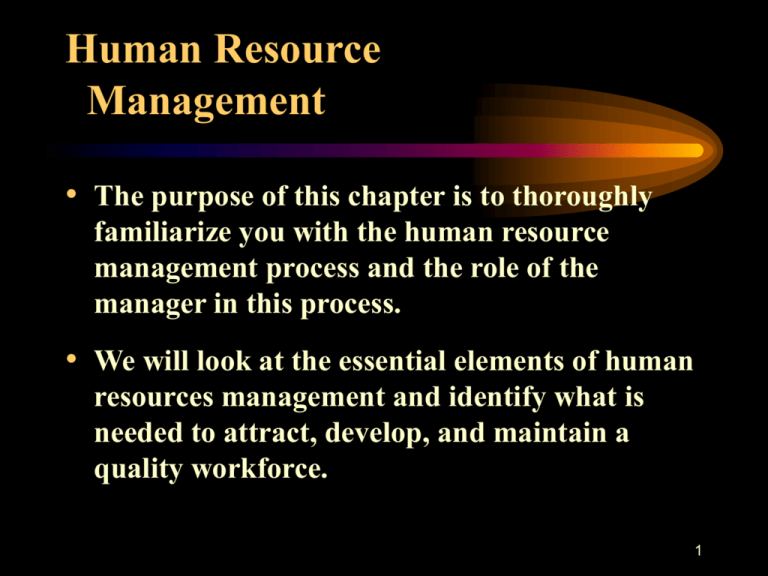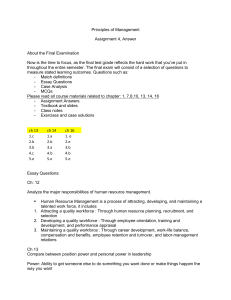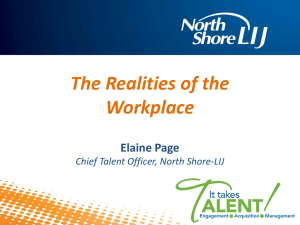Human Resource Management
advertisement

Human Resource Management • The purpose of this chapter is to thoroughly familiarize you with the human resource management process and the role of the manager in this process. • We will look at the essential elements of human resources management and identify what is needed to attract, develop, and maintain a quality workforce. 1 Human Resource Management • A term used to describe the wide variety of activities involved in attracting, developing and maintaining a talented and energetic workforce. 2 Human Resource Management • It involves managerial responsibility not only for staffing organizations with capable workers, but also for ensuring that their performance potential is fully realized. 3 Human Resources Management • Attracting a quality workforce HR Planning - Recruitment - Selection • Developing a quality workforce Orientation - Training and Development Career Planning and Development 4 Human Resources Management • Maintaining a quality workforce Managing Retention and Turnover Performance Appraisal Compensation and Benefits Labor Management Relations 5 Influences of the Legal Environment • HR management must be accomplished within the framework of government laws and regulations, which cover activities related to: Pay - Employee Rights - Retirement Occupational Health and Safety - Privacy Vocational Rehabilitation Employment Discrimination Labor Relations 6 Employment Discrimination • "Employment-at-Will" Doctrine 1926 - Railway Labor Act 1935 - Wagner Act (NLRA) 1963 - Equal Pay Act 1964 - Civil Rights EEO Act (Affirmative Action / EEOC) 1981 - Age Discrimination Act 1990 - Americans With Disabilities Act 7 Human Resource Planning • The process of analyzing staffing needs and identifying actions to satisfy these needs over time. • It must support the implementation of strategies and advance the accomplishment of key objectives. 8 Human Resource Planning • It is having the right people available to do the required work essential to the success of any strategy, and • It is the responsibility of all managers to ensure that all jobs in their work units are filled with people who can best perform the required tasks. 9 Steps in the HR Planning Process • Review organizational strategies and objectives. • Establish and refine HR objectives and policies to compliment the strategic plans. • Establish HR needs……..via Job Analysis Job Description Job Specifications. 10 Steps in the HR Planning Process • Forecast....Project future staffing requirements and anticipate internal and external supply. HR Audit Replacement Charts Succession Tables • Take action…recruit - terminate transfer - promote - whatever…. 11 Attracting A Quality Workforce • The Recruiting Process Advertising of job vacancy. Preliminary contact with potential job candidate. Initial screening to create a pool of candidates. 12 Attracting A Quality Workforce • Recruiting Practices External Internal Traditional Realistic 13 Attracting A Quality Workforce • Making Selection Decisions Application Forms Interview or Site Visit Employment Tests (Validity and Reliability) Reference Checks Physical Examinations Analysis and Decision 14 Developing A Quality Workforce • SOCIALIZATION A process of systematically changing the expectations, behavior, and attitudes of a new employee in a manner considered desirable by the organization. 15 Developing A Quality Workforce • SOCIALIZATION It begins with the initial Employee Orientation and continues during later training and development activities as well as day-to-day supervisor-subordinate relations. 16 Developing A Quality Workforce • Training and Development A set of activities that provides learning opportunities through which people acquire and improve job related skills. 17 Developing A Quality Workforce • Types of Training On-the-Job • Job Rotation - Coaching - Apprenticeship Modeling - Mentoring Off-the-Job • Management Development • Management Simulation Games 18 Developing A Quality Workforce • The Role of Performance Appraisal The process of formally assessing someone's work and providing feedback on performance. 19 Developing A Quality Workforce • Purposes of Performance Appraisal Evaluation: Letting people know where they stand relative to objectives and standards. Development: Assisting in the training and continued personal development of people. 20 Developing A Quality Workforce • Performance Appraisal Methods Graphic Rating Scales Narrative Technique Behaviorally Anchored Rating Scales Critical-Incident Techniques Multiperson Comparisons 21 Maintaining A Quality Workforce • Career Development A Career is a sequence of jobs and work pursuits constituting what a person does for a living. • A Career Path A sequence of jobs held over time during a career. 22 Maintaining A Quality Workforce • Career Planning Is the process of systematically matching career goals and individual capabilities with opportunities for their fulfillment. 23 Maintaining A Quality Workforce • Career Stages The Move to Early Adulthood Mid-life Transition Middle and Later Adulthood A Career Plateau 24 Maintaining A Quality Workforce • Retention and Turnover Promotions Transfers Layoffs Retirements Early Retirements Firings 25 Maintaining A Quality Workforce • Managing Compensation and Benefits Base Compensation Fringe Benefits Competitive Structures Flexible Programs 26 Maintaining A Quality Workforce • Labor-Management Relations Labor unions are organizations to which workers belong and which collectively deal with employers on their behalf. • Typical Provisions of a Union Contract Job Specification and Work Rules Seniority Provisions Compensation Grievance Mechanisms 27 Legislation Governing LaborManagement Relations • The National Labor Relations Act (Wagner Act) 1935 • The Labor Management Relations Act (Taft-Hartly) 1947 • The Labor Management Reporting and Disclosure Act (LandrumGriffith) 1959 28 Bargaining Strategies • Unions Use • Companies Use Strike Lockout Boycott Strike Breakers Picket Injunctions Slowdown 29 Bargaining Strategies • The Traditional Adversarial View "Win-Lose” • The New and Emerging View "Win-Win" 30






